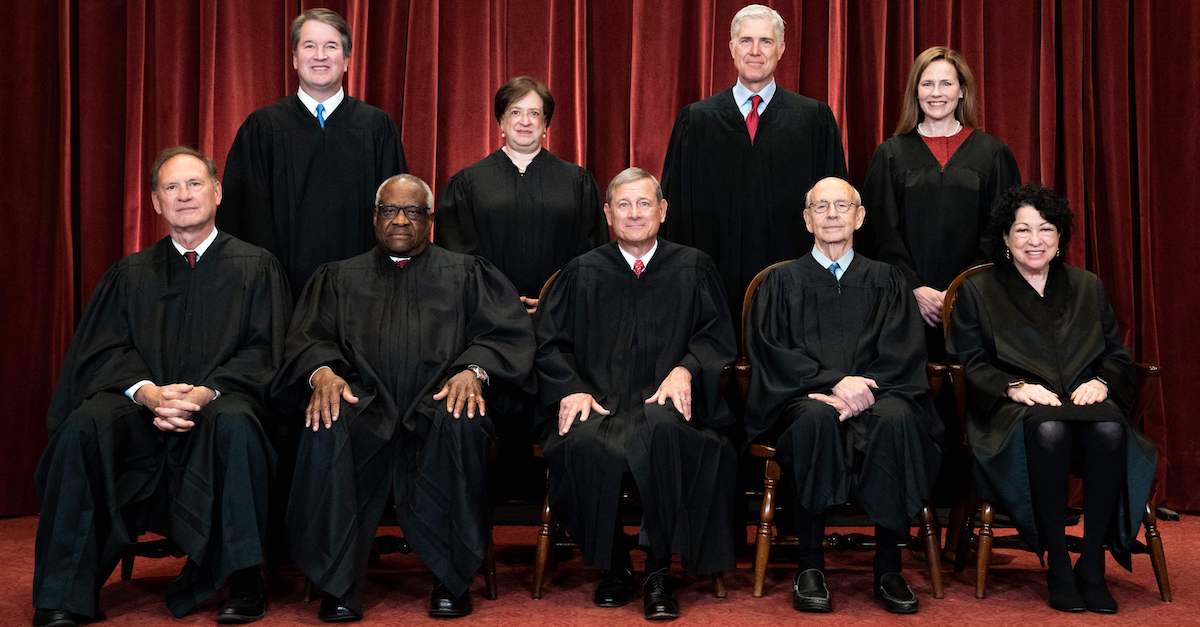
The Supreme Court of the United States heard oral arguments on Tuesday in Shurtleff v. Boston, a dispute over whether the City of Boston should have to fly a conservative Christian group’s religious flag outside Boston’s City Hall.
Three flags fly outside Boston’s City Hall in an area specifically designated as a “public forum.” One is the U.S. flag, another is the Massachusetts state flag, and the third rotates among various flags. Private groups are encouraged to apply to temporarily include their own flag for the express purpose of “foster[ing] diversity and build[ing] connections among Boston’s many communities.” The conservative Christian group Camp Constitution submitted an application to display its flag, listing it as a “Christian” flag.
The flag in question, seen below, is a flag containing a Latin cross.

Camp Constitution’s proposed flag.
When the City of Boston denied approval for the flag, Camp Constitution sued, alleging that its First Amendment rights had been violated.
The case tests the scope of the “government speech doctrine,” the legal concept whereby government entities have the right to their own free speech and need not be confined by any mandate to allow opposing viewpoints. Camp Constitution argues that in displaying its flag as speech in a public forum, it is entitled to full free speech rights, and that the City of Boston is not entitled to censor statements related to religion. Boston, on the other hand, argues that the display of flags amounts to government speech, and that it is entitled to curate its own message, including the flags it wishes and excluding others it disdains.
During Tuesday’s arguments, the justices posed questions in an attempt to tease out whether flag-flying constitutes government speech or private speech.
Justice Sonia Sotomayor, participating remotely in the proceeding from her chambers as has become her practice of late, struck at the heart of the issue’s difficulty. The justice pressed Camp Constitution on the practicality of considering the flag’s use as private speech, when such a characterization would require total viewpoint neutrality. “Really you’re saying a city can’t have an open policy,” she commented to Camp Constitution’s attorney Matthew Staver. “Because no city is going to put up a swastika.”
Several times, Sotomayor also raised the point that an ordinary observer would not be likely to walk past City Hall’s flags and understand that one of three flags is being flown by a private group rather than a government entity. When Staver argued that a passerby would likely know that a commemorative or foreign flag would be the statement of a private group and not a public entity, the justice was unconvinced. “Wow. That is very, very informed,” reacted Sotomayor. “That is not the typical person who walks the street in Boston.”
Later, Justice Elena Kagan picked up on Sotomayor’s point. Calling the idea that an ordinary observer would know private organizations are responsible for flying their flags at City Hall “an assumption that verges on a fiction,” Kagan argued that an ordinary passerby “does not know the contours of the flag raising program.” Justice Amy Coney Barrett commented that she agreed with the point made by Sotomayor and Kagan.
Questioning what limits Staver would put on government’s right to pick and choose which messages it will display, Justice Brett Kavanaugh asked: What about Al-Qaeda flag?
“Suppose someone wants to fly the Al-Qaeda flag at City Hall in Boston. You’re saying they would have a right to do that?” the justice pressed.
Justice Samuel Alito grilled Assistant to the Solicitor General Sopan Joshi on the argument he made on behalf of the Biden administration. Alito said Boston’s policy as described in the government’s brief had been “reverse engineered” to fit with the arguments being made to the Court, and described the city’s policy as singling out religion for exclusion.
Attorney Douglas Hallward-Driemeier argued on behalf of the City of Boston, and gave the justices a handy analogy to use throughout the proceedings. Explaining that Boston seeks to speak its own message that is “one of diversity, but not of religion,” Hallward-Driemeier likened the distinction raised in the case as the “difference between a symposium and an open mic night.” The former is a government-curated event with messaging and participants chosen —and to some degree endorsed —by the host; the latter is an event for which the government host merely provides the forum.
At several points during Tuesday’s arguments, the justices expressed frustration over having to decide the issue at all. Multiple questions came from the bench as to why the case has not been settled between the parties.
[image via Erin Schaff/POOL/AFP via Getty Images]